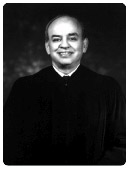Former justices

Justice Horace W. Wilkie
Wisconsin Supreme Court Justice: 1962–1976Chief Justice: 1974–1976
Life: 1917–1976
"The degree of civilization we achieve is demonstrated by our system of judicial administration." – Chief Justice Horace W. Wilkie, Law Day speech (1971)
Horace W. Wilkie was born in Madison, Wisconsin, January 9, 1917. He graduated from the University of Wisconsin in 1938, Phi Beta Kappa, with an economics degree. He earned a law degree from George Washington University in 1944. During the interim, Wilkie studied at the University of Minnesota, American University and the National Institute of Public Affairs.
After serving in the U.S. Coast Guard during World War II, Wilkie returned to Madison to join his father's law practice. Wilkie chaired the Madison Housing Authority, where he worked to provide adequate public housing in the postwar years. For his efforts, Wilkie received the Madison Junior Chamber of Commerce "outstanding young man of the year" in 1947.
Wilkie was involved with a group who worked to revitalize the state Democratic Party in the late 1940s and 1950s. After three unsuccessful bids for the U.S. Congress, he was elected to the state Senate in 1956. He authored 129 bills, 47 of which became law. Most notable was Wisconsin's first open meetings law. He spearheaded the first comprehensive court reorganization program since 1848. Wilkie served in the Senate until Governor Gaylord A. Nelson appointed him to the Wisconsin Supreme Court in 1962.
Wilkie won election to the Supreme Court in 1964 and was re-elected in 1974. In 1974, he became the chief justice following the retirement of Chief Justice E. Harold Hallows.
On the bench, he was most proud of writing the 1964 state legislative reapportionment decision, in which the Wisconsin Supreme Court became one of the first state courts in the nation to order reapportionment of legislative districts on the basis of one person, one vote. He campaigned vigorously for court reform, creating a one-level trial court system, an intermediate Court of Appeals and a Supreme Court with authority to suspend or remove judges for just cause. These changes, Wilkie believed, were key to ensuring justice and are still in place today.
Wilkie died May 23, 1976, before he was able to see many of his goals for court reform become constitutionally mandated in 1978. Wilkie was married to Marian Beardsley. They had five daughters: Joan, Betsy, Lucy, Christine and Gretchen. In a footnote to his first financial statement, Wilkie listed his wife and daughters as his most important assets.

